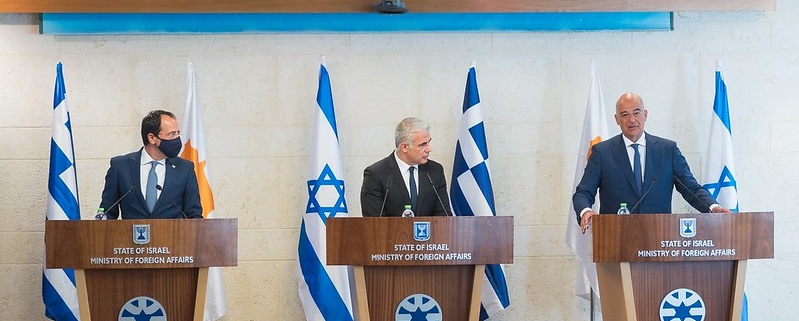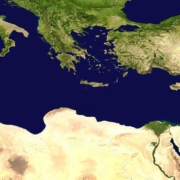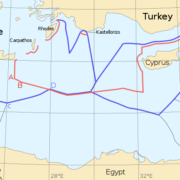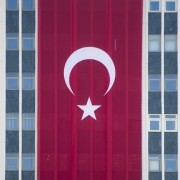In the light of hydrocarbon reserves discovered in the East Mediterranean, the attention shifted towards this corner of the Mediterranean, where Europe meets the Middle East. This article is part of a trilogy that explores the latest challenges East Mediterranean experience based on these new findings.
Article 1 “Conflicts in the East Mediterranean: Why it matters” shed light on the particularities of this region and how the recent hydrocarbon findings have contributed to the current crises.
In this analysis, Article 2 of the trilogy, the objective is to monitor the shifting dynamics in this region and understand how each entity or state adapts to this new reality. On this account, the below section enlists the group of regional players from the perspective of their rebranded identity motivated by the discovery of hydrocarbons findings.
An introduction to the regional players of the East Mediterranean
The below list focuses on the East Mediterranean countries where gas deposits were spotted: Cyprus, Israel and the Palestinian territory. It also extends to two more countries of geostrategic importance that will emerge as vital energy hubs in the region; Greece and Turkey.
Cyprus
Since 1974, the balance in Cyprus has been delicate. The split between the Republic of Cyprus (RoC) in the South and the Turkish Republic of Cyprus in the North ruled has brought tension to the region and has been a constant reminder of how stability could turn to war.
The recent discovery of hydrocarbons in Cyprus raised high expectations for its future¹. The exact gas estimates are yet to be confirmed. However, there are indications of substantial reserves that could meet the domestic demand.
All these years, the island has been relying heavily upon oil imports. The ability to extract its gas could transform its economy by reducing its annual bills and by boosting its savings. Not only that, but also Tsakiris foresees the potential of exporting significant volumes to Egypt and Jordan due to the increasing gas demand in both countries. (Giannakopoulos, 2016).
A less optimistic version of this new reality is the outbreak of clashes between the Greek and Turkish Cypriot communities. The unresolved Exclusive Economic Zone between the Republic of Cyprus (RoC) and the Turkish Republic of Northern Cyprus (TRNC) could hinder gas production in Cyprus.
On one side, the Republic of Cyprus tries to avoid the risk of freezing its hydrocarbon development while fearing for its sovereignty. On the other hand, the Turkish Cypriot community feels left out from the use of the natural resources of the island.
Adding to the crisis, the involvement of Turkey as the protector of the Turkish Cypriots complicates matters further. Not only Turkey does not recognise the authority of the RoC; it also questions the validity of the bilateral demarcation agreements that RoC signed with Egypt, Lebanon, Israel respectively.
Israel
During the 1990s, the Israelis had established strong diplomatic ties with the Turks. For the years to come, Israel viewed Turkey as a reliable ally in the Middle East. Moreover, the US saw this strategic partnership as a guardian for regional stability and security.
In the early 2000s, Turkey released new plans to get closer to the Muslim world, which inevitably downgraded this strong partnership. As a result, Israeli-Turkish relations have begun to deteriorate; a development that left Isreal with a void in its strategic opening in a region susceptible to conflicts and instability.
What is more, the discovery of abundant gas reserves in the late 2000s has shifted Israel’s strategic priorities. So far, the focus has been on supplying the domestic market with its own gas. Soon, Israel will need to shape its energy plan² and determine what proportion of its gas production will be allocated for exports. To serve the last purpose and optimise the gas production levels, Israel will need to resolve its outstanding maritime borders with Egypt and Lebanon.
In parallel with the civil war in Syria-Iraq and the troubled relations with Egypt, these events pose an immediate security threat for Israel. Consequently, the need for like-minded partners with common interests has brought Israel closer to Cyprus and Greece.
The driving force for this new partnership is a) the discovery of gas reserves in Cyprus, b) the EU membership that both countries hold, c) the strive for safeguarding the status quo in the region.
Greece
For many decades, Greece followed an inward foreign policy. The weight fell on the recovery from the domestic economic crisis and the sustainability of the status quo. As expected, this diplomatic inertia³ led to substantial neglect of its strategic position and missed the opportunity to strengthen its diplomatic ties.
Recently, Greece has reviewed its foreign policy. Athens has become more eager to establish alliances with other regional states. New partnerships with Israel, Cyprus and Egypt emerged. As Dokos notices, this change is motivated by Greece’s vision to expand its footprint to the regional energy map (Aggelopoulos, 2016).
Decidedly, the EU’s initiative to diversify its energy supply from the Caspian region gave Greece a strategic advantage. Plus, the prospect of constructing the East Med pipeline – between Cyprus, Greece, Israel and Egypt – that will transport gas to Europe, adds to the case of Greece becoming an emerging energy hub.
Thus, this East Mediterranean country will become a link of major pipelines (the Trans Adriatic Pipeline – TAP and the Interconnector Greece Bulgaria – IGB) that will transfer gas safely to Europe. In other words, Greece is likely to engage more actively in future regional affairs.
The Palestinian Territory
The recent discovery of gas deposits in the Gaza coast is estimated to boost the economy and cover the local needs. So far, there have been many hurdles that did not encourage the gas extractions; among them, the undefined maritime borders.
Turkey
Traditionally, Turkey has been a reliable NATO ally and guard for regional stability in a troubled region. Apart from its strong ties with the West, Turkey maintained diplomatic relations with Egypt and Israel.
What is more, the discovery of hydrocarbon reserves in Azerbaijan advanced the relations with the EU. In the early 2000s, the EU nominated Turkey as a leading partner for safely supplying Europe with gas from the Caspian region while skipping Russia.
Since 2015, Turkey foreign policy doctrine has turned a new leaf aspiring to become a leading regional player. As mentioned above, energy and political ambitions overlap in Eastern Mediterranean than in any other region. Additionally, Turkey envisions becoming a leading exporter from an import-based economy, which will enhance its geostrategic role in the East Med. Therefore, this part of Europe plays an integral part in its new plans.
In this setting, Turkey started to move away from the Western umbrella and to approach other players, such as Russia, China, Qatar.
However, its external policy remains cautious towards the US. Despite the new openings, Ankara takes careful steps not to alienate itself from the US sphere. Such an evolution would be detrimental for the country; in the scenario that Washington decides to replace Turkey with Israel.
Finally, this new vision has exacerbated Turkey’s relations with fellow states in the region. Aside from the revival of old disputes, traditional alliances with Egypt and Israel have also been deeply severed. Maintaining negative relationships with gas-producing or importing countries will cost Turkey its reliability and further isolate it from playing an influential role in the region.
Conclusions
Based on the above, one can observe the strategic plans of the regional players. The discovery of hydrocarbon reserves has undoubtedly changed the regional dynamics. It is only left to see how it will shape the future in the region.
The final article of this trilogy encompasses these new changes and goes one step further. It examines how this new reality has contributed to the revival of old disputes that threaten regional stability in the East Mediterranean.
Photo: Greek Ministry of Foreign Affairs. Tripartite Meeting of Greece-Israel- Cyprus (Jerusalem, 22.08.2021) (2021). Source: (flickr.com)| (CC BY-SA 2.0)
Footnotes
[1] Raised high expectations for its future:
Many restrictive factors contradict the optimistic scenarios for Cyprus gas reserves. First of all, the sales and gas purchase agreement is not complete. This process usually takes years to be finalised.
Second, the Aphrodite reserves may not be adequate to justify the construction of an LNG facility. Instead, the discovered gas deposits could cover the domestic demand for the next couple of decades.
[2] To shape its energy plan:
Unless more deposits arise, exporting gas surplus – via a pipeline or after liquefaction – is not a viable option for Israel; both options are costly and time-consuming.
[3] This diplomatic inertia:
Because Greek foreign policy follows a line of regional stability – that someone might perceive as a sign of passivity – does not mean the country would not react to an aggressive move that violates its sovereignty rights.
The most likely scenario is that Greece will do everything possible to defend its natural resources using the international law path.
Bibliography
Ant O. (2020) Turkey Urges EU States to End ‘Blind’ Support for Greece in Spat, Bloomberg, 11th of September, Available at: https://www.bloomberg.com/news/articles/2020-09-11/turkey-urges-eu-states-to-end-blind-support-for-greece-in-spat [Accessed 23/08/2021]
Anthony I. and Sahlin M. (2020) Maritime disputes in the eastern Mediterranean: Why and why now? Stockholm International Peace Research Institute, Available at: https://www.sipri.org/commentary/essay/2020/maritime-disputes-eastern-mediterranean-why-and-why-now [Accessed 26/08/2021]
Aydintasbas A. and Bianco C. (2021) Useful enemies: How the Turkey – UAE rivalry is remaking the Middle East, European Council on Foreign Relations, 15th of March, Available at: https://ecfr.eu/publication/useful-enemies-how-the-turkey-uae-rivalry-is-remaking-the-middle-east/ [Accessed 26/08/2021]
De Carbonnel A., Ellinas C., Fabiani R., Grigoriadis I and Mandiraci B (2020) Rising Tensions n the Eastern Mediterranean, Overview of Event Recording, July, International Crisis Group, Published, Available at: https://www.crisisgroup.org/europe-central-asia/eastern-mediterranean/rising-tensions-eastern-mediterranean [Accessed 23/08/2021]
EURACTIV.com with AFP (2020) Gas fields and tensions in the eastern Mediterranean, EURACTIV, 26th of October, Available at: https://www.euractiv.com/section/energy-environment/news/gas-fields-and-tensions-in-the-eastern-mediterranean/ [Accessed 23/08/2021]
Giannakopoulos A. (2016) Energy Cooperation and Security in the Eastern Mediterranean: A Seismic Shift towards Peace or Conflict? Research Paper 8, The S. Daniel Abraham Center for International and Regional Studies, Tel Aviv University, Available at: https://www.ceps.eu/wp-content/uploads/2016/03/Energy%20Cooperation%20and%20Security%20in%20the%20Eastern%20Mediterranean%20small%20file.pdf [Accessed 30/08/2021]
Gulsun Saglamer, UN Chronicle: The Mediterranean Sea: Cradle of Civilization, United Nations, Available at: https://www.un.org/en/chronicle/article/mediterranean-sea-cradle-civilization [Accessed 23/08/2021]
International Crisis Group (2019) Steading the New Status Quo in Syria’s North East, Crisis Group Middle East Briefing No 72, Ankara/Qamishli/Brussels, 27th of November, Available at: https://www.crisisgroup.org/middle-east-north-africa/eastern-mediterranean/syria/b72-steadying-new-status-quo-syrias-north-east [Accessed 27/08/2021]
JINSA (2019) Sea Changes: US Challenges and Opportunities in the Eastern Mediterranean, JINSA Gemunder Center’s Easter Mediatteranean Policy Project, Washington, August, Available at: https://jinsa.org/wp-content/uploads/2019/08/Sea-Changes-U.S.-Challenges-and-Opportunities-in-the-Eastern-Mediterranean.pdf [Accessed 27/08/2021]
Marcus J. (2020) The Eastern Mediterranean tinderbox: Why Greek-Turkish rivalries have expanded, BBC News, 25th of August, Available at: https://www.bbc.co.uk/news/world-europe-53906360 [Accessed 23/08/2021]
Nedos V. (2021) Delusions over the status quo, Ekathemerini.com, 16th of May, Available at: https://www.ekathimerini.com/opinion/1161034/delusions-over-the-status-quo/ [Accessed 26/08/2021]
Oğurlu E. (2012) Rising Tensions in the Eastern Mediterranean: Implications for Turkish Foreign Policy, Istituto Affari Internazionali (IAI) Available at: www.jstor.org/stable/resrep09804 [Accessed 26/08/2021]
Reuters Staff (2020) Greek-Turkish tensions rise in crisis over easter Mediterranean, Reuters, 12th of October, Available at: https://www.reuters.com/article/turkey-greece-int-idUSKBN26X2E8 [Accessed 23/08/2021]
Scazzieri L. (2020) CER Insight: Gas heats up the eastern Mediterranean, Centre for European Reform, 23rd of April, Available at: https://www.cer.eu/insights/gas-heats-eastern-mediterranean [Accessed 22/08/2021]
Sheppard D., Pitel L. and Peel M. (20202) What is at stake in the eastern Mediterranean crisis? The Financial Times, 8th of September, Available: https://www.ft.com/content/e872ed5d-1f64-48ae-8b8d-d6b49476e749 [Accessed 23/08/2021]
Skordas A. (2077) Oil Exploitation in the Eastern Mediterranean: Cyprus, Turkey and International Law, Remarks presented at Wilson Centre Event, University of Bristol School of Law, March, Published, Available at: https://www.wilsoncenter.org/event/oil-exploitation-the-eastern-mediterranean-cyprus-turkey-and-international-law [Accessed 22/08/2021]
Spencer M. S., Sitilides J., Lesser I., Norton R. S., Wimbush S. E., Binder D., Von Tersch E., Bryza M., Weston T., Meyer S. (2004) Unconventional Challenges in the Eastern Mediterranean: Strategic Engagement in a New Era, Executive Summary presented at Wilson Centre Event, Western Policy Centre, October, Available at: https://www.wilsoncenter.org/event/unconventional-challenges-the-eastern-mediterranean-strategic-engagement-new-era [Accessed 22/08/2021]
Tol G. (2020) Viewpoint: Why Turkey is flexing its muscles abroad, BBC NEWS, 16th of October, Available at: https://www.bbc.co.uk/news/world-europe-54547304 [26/08/2021]
Tuysuz G. (2020) NATO allies are facing off in the Eastern Mediterranean. The conflict could entangle the entire region, CCN, 26th of August, Available at: https://edition.cnn.com/2020/08/25/europe/greece-turkey-eastern-mediterranean-tension-intl/index.html [Accessed 26/08/2021]
Wintour P. (2020) How a rush for Mediterranean gas threatens to push Greece and Turkey into war, The Guardian, 11th of September, Available at: https://www.theguardian.com/world/2020/sep/11/mediterranean-gas-greece-turkey-dispute-nato [Accessed 23/08/2021]










Leave a Reply
Want to join the discussion?Feel free to contribute!